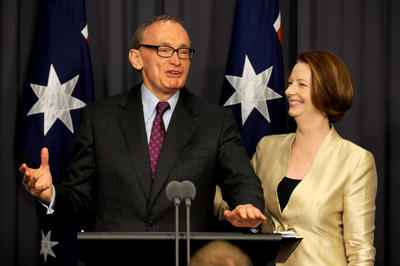Mr Carr’s appointment to the foreign minister’s job is of more than usual interest.
He takes over from Rudd, who even as prime minister was a very hands-on, activist diplomatic player. Rudd brought incredible energy, talent and professional experience to foreign affairs. With his fluency in Mandarin and background on China, there were high expectations of his capacity to lead Australia through a period of great change in an economic and strategic environment centred on the rise of the new Asian powers.
There is no doubt that Rudd had some notable achievements in international diplomacy during his tenure as prime minister and foreign minister — the stand-outs are his role in entrenching the G20 process and Australia’s (and Indonesia’s) seat at the table through the global financial crisis, and identifying the gap in regional architecture on political and security affairs. Rudd’s standing on the international stage was, and undoubtedly still remains, high.
But as a diplomat (and a political leader) Rudd also carried some baggage. His style, despite his professional background, was viewed as too brittle for success, in both roles. In regional affairs he was often seen as pressing initiatives with insufficient consultation. Rudd’s flagship initiative, the Asia Pacific Community, was launched without much consultation with the foreign affairs department. The special envoy for the project, Richard Woolcott, a veteran Australian diplomat was told of his appointment only a few hours before the press conference.
In dealing with China he was unfairly but rather successfully characterised by his political opponents at home as a Manchurian candidate at the same time as he came to be seen in Beijing as a posturing latter day Cold War warrior. A former Chinese diplomat, now working for the foreign ministry think tank openly criticised the strained relationship between China and Australia under Rudd last week.
Many commentators regarded Rudd’s defence white paper as unnecessarily provocative. If Wikileaks cables were to be believed, he had advised Hilary Clinton to be prepared to ‘deploy force [against China] if everything goes wrong’.
He was ill-inclined to take advice on matters on which he was convinced he knew best. He stood back from Prime Minister Gillard’s much welcomed initiative to review Australia’s interests in the Asian Century, a widely consultative process that is seen as important to positioning Australia to manage its rapidly changing external environment. As foreign minister, especially in his recent Asia Society speech, he sought to nuance his diplomacy, but all too late.
Carr comes to the post with more impressive credentials than his state-based political background might suggest. At 64, he has an active and impressive background in foreign policy affairs, with a deep knowledge of the United States and unparalleled connections in Washington, wide links in Europe and a deep understanding of Asia. His wife is Malaysian born. He is polished and professional, curiously more the diplomat’s diplomat. It is a job that he’s being preparing for all his life.
It has been reported in the Australian press that Carr is less sympathetic to the hawkish US approach to China than Rudd. ‘From time to time, it is our role to tone down some American enthusiasms. We should be talking caution. We should be cautioning them on China’, said Carr before he was appointed the foreign minister.
More importantly, Carr brings his own view to the changes taking place in Asia. While, like most of the Australian foreign policy establishment, he sees the American security alliance as crucial to Australian interests, Carr will be less inclined to see it preventing Australian initiative with Australia’s major Asian partners, in the political sphere as well as the economic sphere. There is no doubt that he will bring his considerable talent and weight to bear on the Asian Century White Paper exercise and he will be more inclined as foreign minister to reach out and find common ground with his political opponents on this and on other matters.
Justin Li is principal of the Institute of Chinese Economics and an associate of East Asia Forum.


The Department of Foreign Affairs and Trade is arguably the most important Ministry in a country where trade dominates the economy. It is, therefore, important to have highly competent people in the position. Small mistakes in this Ministry can lead to large negative impacts. It’s easy to be critical of Rudd now that he is no longer the Minister. At the same time, however, Rudd did lift the profile of Australia in the international scene and this wasn’t such a bad thing. It’s too early to judge whether or not Bob Carr will be any better than Rudd (remembering of course that Carr did not exactly have a mistake free experience at the State Government level) or even whether the Coalition’s shadow minister, Julie Bishop, will be up to it.